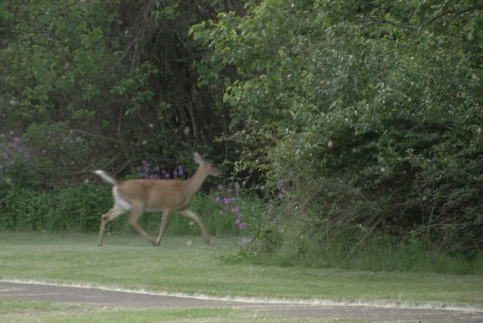3rd Case of Chronic Wasting Disease Confirmed in Meridian Township
- Published: 8/6/2015
- Comments
MERIDIAN TOWNSHIP - The Michigan Department of Natural Resources (DNR) announced that a third free-ranging deer in Meridian Township has tested positive for Chronic Wasting Disease (CWD.)
The third deer found was a 5-year-old doe and the DNR isn't surprised by the discovery of a third CWD-positive deer. All three deer that tested positive for CWD for were discovered within a mile of one another.
Chad Stewart from the DNR said "We've had some genetic testing done by Michigan State University's Molecular Ecology Laboratory and the test indicated that all three deer seemed to come from the same extended family. So if there is a silver lining to this it's that it's within one family."
As of Friday July 31, 2015, 453 deer have been tested for CWD; 377 came from the DNR's core testing area, 53 have come from surrounding counties, and the remaining 23 have come from various parts of the state.
Stewart said that their efforts to locate deer with CWD have proven to be productive and the DNR plans to continue their efforts.
"We're gonna need to sample several thousand deer, probably 3-4,000 deer at minimum. And once we get close to those numbers we'll have a better idea of what we're looking at as far as how many deer are infected locally and then how wide spread it is and then we'll make management recommendations based off of those numbers," said Stewart.
In order to help, resident's are encouraged to;
1. Pay attention to all deer feeding and bait bans that have been put into place.
2. If you see a deer that looks abnormally skinny, drooling, not afraid of humans, or any any other symptoms of CWD, contact the DNR right away.
3. Hunters are asked to please continue hunting in the area and to get their deer tested.
As of now, there is no evidence that chronic wasting disease present's a risk to non-cervids, including humans, through contact with infected animals or from handling venison.
Still, as a precaution, the U.S. Centers for Disease Control and the World Health Organization recommended that infected animals not be consumed as food by either humans or domestic animals.


 Spanish
Spanish Chinese (Simplified)
Chinese (Simplified) Korean
Korean French
French German
German Hindi
Hindi Urdu
Urdu Japenese
Japenese Arabic
Arabic Russian
Russian Farsi
Farsi
